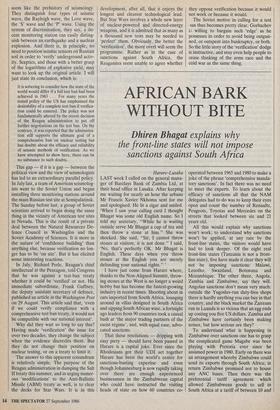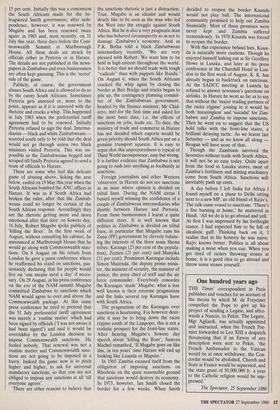AFRICAN BARK WITHOUT BITE
Dhiren Bhagat explains why
the front-line states will not impose sanctions against South Africa
Harare–Lusaka LAST week I called on the general mana- ger of Barclays Bank of Zambia Ltd, at their head office in Lusaka. After keeping me waiting for nearly an hour the urbane Mr Francis Xavier Nkhoma sent for me and apologised. He lit a cigar and smiled. `When I saw your calling card I thought Bhagat was some old English name. So I told my secretary, "While he is waiting outside serve Mr Bhagat a cup of tea and then throw a stone at him." She was shocked. She said, "Sir, I cannot throw stones at visitors, it is not done." I said, `No, that's perfectly OK. Mr Bhagat is English. These days when you throw stones at the English you are merely defending your national rights."
I have just come from Harare where, thanks to the Non-Aligned Summit, throw- ing stones at the West is no longer a weird hobby but has become the fastest-growing industry in recent times. Shooting about in cars imported from South Africa, lounging around in villas designed in South Africa and sipping South African wine, a fortnight ago leaders from 90 countries took a casual bash at 'the major trading partners of the racist regime', and, with equal ease, advo- cated sanctions.
That these resolutions — dripping with easy piety — should have been passed in Harare is a capital joke. Ever since the Rhodesians got their UDI act together Harare has been the world's centre for sanctions-busting expertise and even though Johannesburg is now rapidly taking over there are enough experienced businessmen in the Zimbabwean capital who could have instructed the visiting heads of state on how 60 countries co- operated between 1965 and 1980 to make a joke of the phrase 'comprehensive manda- tory sanctions'. In fact there was no need to meet the experts. To learn about the efficacy of sanctions all that the NAM delegates had to do was to keep their eyes open and count the number of Renaults, Peugeots, Toyotas and Mercedes on the streets that looked between six and 21 years old.
All this would explain why sanctions won't work; to understand why sanctions won't be applied, at any rate by the front-line states, the visitors would have had to look deeper. Of the eight real front-line states (Tanzania is not a front- line state), five have made it clear they will not be imposing sanctions: Malawi, Lesotho, Swaziland, Botswana and Mozambique. The other three, Angola, Zambia and Zimbabwe, say they will. Angolan sanctions don't mean very much: outside the Yugoslav-run duty-free shops there is hardly anything you can buy in that country, and the black market the Zaireans run in Luanda is so vicious that an egg ends up costing you five US dollars. Zambia and Zimbabwe have certainly been making noises, but how serious are they?
To understand what is happening in Zimbabwe over sanctions one has to grasp the complicated game Mugabe was been playing with Pretoria ever since he assumed power in 1980. Early on there was an arrangement whereby Zimbabwe could send its exports through South Africa; in return Zimbabwe promised not to house any ANC bases. Then there was the preferential tariff agreement which allowed Zimbabwean goods to sell in South Africa at a tariff of between 10 and 15 per cent. Initially this was a concession the South Africans made for the be- leaguered Smith government; after inde- pendence, however, it was renewed by Mugabe and has been renewed twice again: in 1983 and, most recently, on 31 July this year, three days before the Com- monwealth Summit at Marlborough House. All these deals are struck by officials either in Pretoria or in Harare. The details are not published in the news- papers in Zimbabwe and even businessmen are often kept guessing. This is the 'secret' side of the game.
Publicly, of course, the government abuses South Africa and is allowed to do so by the canny South Africans. Sometimes Pretoria gets annoyed or, more to the point, appears as if it is annoyed with the rhetoric and cracks a whip. This happened in July 1983 when the preferential tariff agreement had to be renewed. Initially Pretoria refused to sign the deal. Interme- diaries — black and white Zimbabweans scurried south only to be told that the deal would not go through unless two black ministers visited Pretoria. This was im- possible so the Zimbabweans begged and scraped till finally Pretoria agreed to send a team of officials to Harare.
There are some who feel this delicate game of abusing above, licking the arse below, ended on 19 May this year when the South Africans bombed the ANC offices in Harare. It was as if South Africa had broken the rules; after that the Zimbab- weans could no longer be certain of the South African response. Accordingly they see the rhetoric getting more and more emotional after that date: on Soweto day, 16 July, Robert Mugabe spoke publicly of `killing the Boer'. In the first week of August, without consulting his cabinet, he announced at Marlborough House that he would go along with Commonwealth sanc- tions. On 8 August on his return from London he gave a press conference where he reaffirmed his stand on sanctions, pas- sionately declaring that his people would live on 'one mealie meal a day' if neces- sary. On 29 August, at his press conference on the eve of the NAM summit Mugabe committed Zimbabwe to sanctions which NAM would agree to over and above the Commonwealth package. At this same press conference he tried to pretend that the 31 July preferential tariff agreement was merely a 'routine matter' which had been signed by officials CI was not aware it had been signed') and said it would be overridden by the London decision to impose Commonwealth sanctions. He fooled nobody. That renewal was not a routine matter and Commonwealth sanc- tions are not going to be imposed in a hurry. Indeed the game now is to pitch higher and higher, to ask for universal mandatory sanctions, so that you are not obliged to impose any sanctions at all 'till everyone agrees'.
There are other reasons to believe that the sanctions rhetoric is just a distraction. True, Mugabe is an idealist and would dearly like to be seen as the man who led the West into the struggle against South Africa. But he is also a very pragmatic man who has behaved circumspectly so as not to damage Zimbabwe's economy. And as P.K. Botha told a black Zimbabwean intermediary recently, 'We are very pleased with Robert. We want him to be held in high esteem throughout the world. It is better that we should trade with tough "radicals" than with puppets like Banda.' On August 6, when the South Africans cracked the whip again by closing the border at Beit Bridge and trucks began to pile up, the contingency planning commit- tee of the Zimbabwean government, headed by the finance minister, Mr Chid- zero, met for the first time and asked for the most basic data, i.e. the effects of sanctions on jobs, trade etc. To date, the ministry of trade and commerce in Harare has not decided which exports would be given priority should South Africa put on a genuine transport squeeze. It is easy to argue that this unpreparedness is typical of Third World incompetence; easy but wrong. It is further evidence that Zimbabwe is not going to rush into anything as foolhardy as sanctions.
Foreign journalists and other Western `observers' in Harare do not see sanctions as an issue where opinion is divided on tribal lines. During the NAM circus I busied myself winning the confidence of a couple of Zimbabwean intermediaries who shuttle between Harare and Pretoria. From those businessmen I learnt a quite different story. It is well known that politics in Zimbabwe is divided on tribal lines, in particular that Mugabe runs his Zanu (PF) government by cleverly balanc- ing the interests of the three main Shona tribes: Karanga (25 per cent of the popula- tion), Zezuru (21 per cent) and Manyika (11 per cent). Prominent Karangas include Simon Muzenda, the deputy prime minis-• ter, the minister of security, the minister of justice, the army chief of staff and the air force commander. Everybody concedes the Karangas 'made' Mugabe: what is less well known is their extreme pragmatism and the links several top Karangas have with South Africa.
The pragmatism of the Karangas over sanctions is heartening. For however desir- able it may be to bring down the racist regime south of the Limpopo, this is not a realistic prospect for the front-line states. After hearing Mugabe's Soweto day speech about 'killing the Boer', Samora Machel remarked, 'If Mugabe goes on like this, in ten years' time Harare will end up looking like Luanda or Maputo.'
In 1965 Zambia excused itself from the obligation of imposing sanctions on Rhodesia on the quite reasonable ground that sanctions would destroy its economy. In 1973, however, Ian Smith closed the border for a few weeks. When Smith decided to reopen the border Kaunda would not play ball. The international community promised to help out Zambia financially. Most of these promises were never kept and Zambia suffered tremendously. In 1978 Kaunda was forced to reopen the border.
With this experience behind him, Kaun- da is naturally more cautions. Though he enjoyed himself lashing out at Sir Geoffrey Howe in Lusaka, and later at his press conference at the Churchill Hotel in Lon- don in the first week of August, K. K. has already begun to backtrack on sanctions. At the SADCC meeting at Luanda he refused to answer newsmen's questions on airlinks. In Harare he went so far as to say that without the 'major trading partners of the racist regime' joining in it would be both 'meaningless' and 'suicidal' for Zim- babwe and Zambia to impose sanctions. Then he went on to suggest that the US hold talks with the front-line states, a brilliant delaying tactic. As we learnt last Saturday — and as we knew all along Reagan will have none of that.
Though the Zambians survived the Seventies without trade with South Africa, it will not be so easy today. Quite apart from the food in Lusaka stores, most of Zambia's fertilisers and mining machinery come from South Africa. Sanctions will inevitably push up costs.
A day before I left India for Africa I found myself on a plane to Delhi sitting next to a new MP, an old friend of Rajiv's. The talk came round to sanctions. 'There's a fire burning at home,' he muttered in Hindi. 'All we do is to go abroad and yell.' At first I was impressed by his forthright stance. I had expected him to be full of idealistic guff. Thinking back on it, I realise that in his honesty he was naive. Rajiv knows better. Politics is all about making a noise when you can. When you get tired of rioters throwing stones at home, it is a good idea to go abroad and throw some stones yourself.



























































 Previous page
Previous page